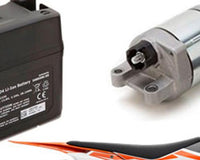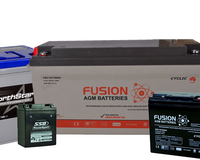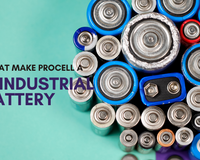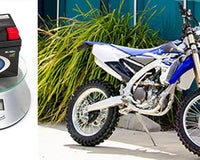Table of Contents
If you own a piece of equipment or system that requires long-term discharge and recharge cycles, gel batteries are most suitable for these. Most of these systems, like solar or an inverter, discharge at night while the battery charges during the day.
Because they are thixotropic, the gelled electrolytes have a consistency like petroleum jelly. As a result, gel batteries need little to no maintenance and can be used almost anywhere without fear of leakage.
Gel batteries are also resistant to drying out, making them ideal for small spaces and higher temperature situations.
Also, because the electrolyte absorbed by the gel layer has several components, gel batteries are highly resistant to vibrations.
Gel batteries are suitable for various equipment, including:
- Floor cleaners and sweepers
- Automated forklifts
- Assistive devices
- Motorhomes
- Automobiles
- Yachts
- Phones
- Smartwatches
- Security systems
However, the same technology that makes gel batteries remarkable for cycle applications also makes them poor for everyday tasks like starting a car. The gel battery’s cranking performance is weak, and for it to be used to start a car, it will need a larger and more powerful battery than a flooded lead-acid battery.
Let's take a closer look at the pros and cons of gel batteries, one of the high-quality batteries we specialise in at HBPlus Battery Specialists.
What is a Gel Battery?
A gel battery is wholly enclosed and doesn’t need repairs. It contains electrolytes in a liquid condensed with silicone filler to form a gel. The electrolyte density and voltage decrease because the charge comes from a charged source, similar to acid batteries.
Gel batteries also have a valve-regulated power source, are super strong, have a wide range of uses, generate negligible emissions, and may be used in areas with limited ventilation.
It is crucial to weigh the benefits and drawbacks of a gel battery before purchasing.
Pros of Gel Batteries
Gel Batteries Don’t Require Maintenance
The gel in the battery ensures that the battery can be used in any situation with no leaks and little to no maintenance. In addition, gel batteries resist sulfation, can last up to 20 years, as opposed to flooded batteries, which have a 5-year lifespan.
Unlike wet cell batteries, gel batteries are deep cycle batteries that don’t need regular watering. This allows the gel batteries to be recharged to a near-new state.
Because there is less need for air, the thixotropic gel electrolytes can be used in any location without fear of leakage.
Expert Tip: Gel batteries charge at lower voltages; hence, special care should be taken when selecting chargers.
Gel Batteries Don’t Leak
Sincgel batteries are sealed with a valve that reduces excess pressure, the removal of excess pressure ensures that the gel electrolytes are not prone to leakage.
Acid spills must be cleaned up when a regular lead-acid battery leaks, posing a significant and hazardous risk to anything the acid comes into contact with.
Gel batteries feature a silica-type gel in which the battery electrolyte is suspended, preventing the electrolyte from seeping out if the shell is shattered.
Gel Batteries Are Vibration-Resistant
Gel batteries are ideal for high-performance vehicles like four-wheelers because of their ability to absorb shock and vibration. Unfortunately, vibration can harm wet cell batteries.
Gel batteries have a non-conductive plastic outer layer that is resistant to chemicals, heat, shock, vibration, and other environmental aggressors.
Cons of Gel Batteries
While the advantages of a gel battery are many, they also have significant shortcomings:
Gel Batteries Are Costly
For many people, the most important drawback of transitioning from wet cells to gel batteries is the high cost of the batteries. Gel batteries are currently more expensive than wet lead-acid batteries, despite requiring little or no maintenance.
Compared between the Fullriver 12V 100Ah deep cycle gel battery and the Drypower 12V 100Ah sealed lead-acid solar power battery in our collection, the gel battery costs 31% more.
Gel Batteries Charge Slowly
You must charge gel batteries more slowly than lead-acid batteries.
Remove gel batteries from the charger immediately after charging to avoid electrolyte voids, which can lead to irreversible damage to the batteries.
If you leave the gel battery to charge while you go about your business, overvoltage can cause the battery to fail and reduce its performance.
To charge a gel battery, use a constant voltage charger, not a taper charger. When the battery's voltage drops, tapering chargers gradually increase the charging current, which is hazardous to a gel battery.

Expert Tip: To get a more accurate reading, leave the gel battery alone for at least 24 hours after charging. If your gel battery's charge is between 14.0 and 14.4, it is fully charged.
So, Are GEL Batteries Worth It?
Yes, gel batteries are worth every cent.
Gel batteries are a popular choice for many applications because of their high energy density, low self-discharge rate, and resistance to overheating. If you're concerned about high temperatures in the location where the batteries will be used, you might want to stick with them.
When adequately charged, gel batteries have a four-times longer lifespan than lead-acid batteries.
As one client learned, the gel batteries are well worth it.
“Excellent battery for the price. Works great so far for basic electrical 12v needs and lasted about a week of use before discharging to about 70% of battery life..."
Edward Chong
Even though gel batteries are pricey, it's worth investing in one because:
- They are leak-proof because there are no liquid electrolytes in them and all acids are suspended in a solid matrix.
- Gel batteries contain acid within the housing, making it safe to handle the batteries without gloves.
- The separator used in these designs is conductive, so the gel battery can transfer heat out of the housing, increasing the efficiency of these devices.
- The valve's high-quality materials ensure the battery's reliability and long life.
- Your voltage doesn't go down because the gel battery continuously optimises performance.
 |
 |
|
| GTX20L-BS offers powerful, long-life performance and exceptional cranking power |
It is safe to use Fusion Deep Cycle Gel Batteries, as they are resistant to extreme vibrations |
With a gelled electrolyte that is more tolerant to drying out, the Power-Sonic Deep Cycle Gel range (DCG) is suited for tighter space constraints and higher temperature conditions |
Related: Learn more about smart batteries.
Is My Battery Gel-Filled or AGM (Absorbent Glass Mat)?
It is easy to confuse gel-filled batteries with AGM batteries.
AGM batteries absorb all their acids using advanced lead-acid technology for excellent cycle stability. This prevents performance degradation, as the battery is repeatedly recharged and discharged.
It's no surprise that AGM and gel batteries have a lot in common. They both use valve-regulated lead-acid technology, are non-spillable, and have no maintenance requirements.
However, there are significant differences between AGM and gel batteries, as listed below.
| Feature | Gel batteries | AGM batteries |
| Cost | Expensive compared to AGM batteries | Less expensive compared to gel batteries |
| Charge | The battery can be ruined even if it is brand new if you make one charging mistake, like overcharging or using a tapering charger | Hold their charge well and charge quickly |
| Technology | Gel paste suspends the electrolyte in the battery case of a gel battery | Internally, the electrolyte is wicked into a glass matt to prevent leakage |
| Life expectancy | You can fully discharge gel batteries up to 90% and still get a much longer cycle life than you would with AGM batteries | Discharging your AGM battery more than 50% and up to 70% is okay, but doing so frequently will significantly shorten the battery's cycle life |

Frequently Asked Questions
Do gel batteries outperform conventional batteries?
Yes. Compared to traditional lead-acid batteries, gel batteries have a longer service life because of their minimal electrode wear.
Are batteries purchased online secure and efficient?
We take great pride in the high quality of our products. If this weren't the case, we'd be out of a job. As a result, you can put your trust in batteries from HBPlus Battery Specialists.
How do I revive a long-dead gel battery?
Because gel batteries are sealed, there is no way to access the cells. Therefore, slow charging is the best way to resurrect a dead gel battery because it helps repair and restore it.
Get a Gel Battery For All Your Needs
Gel batteries offer the ability to save energy for the benefit of future generations. As the supply of electricity decreases, batteries become more important to human life as the population grows.
We recommend using a gel battery because:
- There will be no need to do routine maintenance.
- There will be no spills, providing no considerable and hazardous risk because you will not come into contact with the acid.
- Because of the low amount of corrosion, gel batteries can be used with sensitive electronic equipment.
- Gel batteries are extremely durable and vibration resistant.
- Because there is a reduced possibility of sulfuric acid burns, it is very safe.
- The battery will last far longer than a lead-acid battery for the same amount of use because of its high lifespan.
Now that we’ve reviewed all the benefits of gel batteries, take a look at the wide selection we offer in our online catalog.











